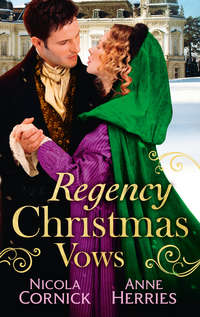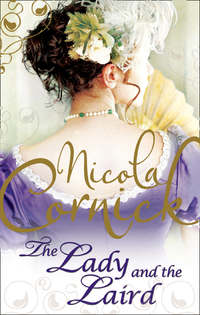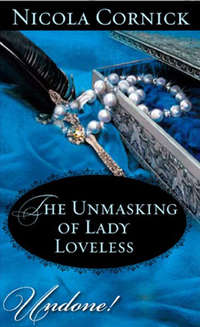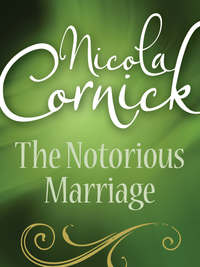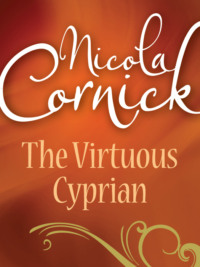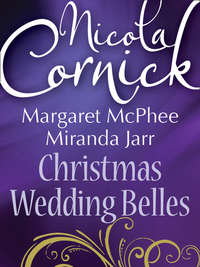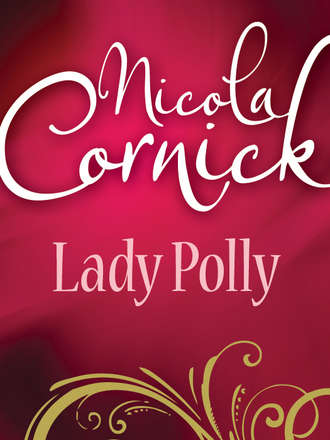
Полная версия
Lady Polly
“Polly!” the Dowager Countess said sharply, as a young buck raised his quizzing glass to ogle her daughter. “Kindly sit back! You do not wish to attract the attention of the hoi polloi!”
Polly’s heart skipped a beat and she sat back slowly, for she had just seen Lord Henry Marchnight in a box across from them. He was in a lively group with Simon Verey, his wife Therese and some of their friends, all laughing animatedly at a remark Lady Verey had just made. Polly felt a quiver of envy and repressed it quickly. It was not that she was bored with her own party, for she always enjoyed Lucille’s company and the Misses Dacre were pleasant enough, if henwitted. Just for once, however, it would be fun to be part of a racier crowd. She was forever being chaperoned about by her mother or some other elderly female relative, which was all very well for a new debutante but decidedly slow for a lady of twenty-three. She risked another look across at the box, to find that Lord Henry was studying her with a concentrated regard which made her pulse beat faster.
The play began, but Polly found it incredibly difficult to concentrate. Normally she became engrossed in a performance, for playgoing was one of her favourite entertainments, but tonight all she seemed able to think about was whether Lord Henry was serious in his pursuit and whether she should respond. On the one hand, he could not have any serious intention and since her feelings were already engaged—and had been so for five years—she would be only stirring up all the old emotions that she should be trying to forget. On the other hand, she could not deny that she derived immense enjoyment from his company. If she managed matters well, perhaps…But could she manage Lord Henry? It would be very dangerous…a challenge, then? No, a risk and a hazardous one at that. Foolish even to consider it, knowing his reputation. But…Polly shivered. A risk worth taking? She had found the Season dull, repetitious. She wanted some excitement…The prim side of her character, the orthodox side, was asking her what on earth she was thinking of, to encourage the attentions of so notorious a rake.
There was a burst of applause, and Polly realised to her horror that the entire first act had passed without her even noticing. The audience started to chatter, to mill around and stretch their legs before the second act. Lucille took Polly’s arm as they strolled out with everyone else.
“What do you think of Venn’s performance, Polly? Is he as accomplished as Edmund Keen, do you think?”
Polly floundered. “Well, perhaps so…Or perhaps not…I need more time to consider—” She broke off as Lord Henry and the Vereys approached, and was not sure whether to be glad or nervous at the interruption.
Lord Henry greeted Lucille very warmly, and once again Polly felt a stirring of jealousy when she considered their friendship. She was not unsophisticated enough to think that just because Lord Henry had suddenly paid some attention to her, he might not be pursuing other interests. But surely Lucille could not rank as one of those! There was an innocence about the Countess of Seagrave which made such a thought seem foolish. Besides, Lucille had now turned her attention to the Vereys, leaving Polly and Lord Henry standing together.
“Are you enjoying the play, Lady Polly?” Lord Henry asked conventionally enough as they strolled down the corridor.
“Yes, thank you, my lord.” Polly was desperately hoping that he would not question her too closely about it.
“You always enjoyed the theatre, did you not?” Lord Henry said with a smile. “You are not one of those who come only to see and be seen! I remember when we came to see As You Like It, you were so enraptured that no one could get a word from you for a full half-hour afterwards!”
Polly blushed. She could remember the occasion to which he referred and the memory troubled her. It had been very early on in their acquaintance, when she was first out, and she had sat through the play in a dream. Although utterly engrossed in the story, she had still been fully aware of Lord Henry sitting slightly behind her, his attention as much on her as it was on the play. He had leant forward, smiling at her enthusiasm, and it had seemed to Polly that his enjoyment had derived as much from her pleasure as from the entertainment.
The bell rang for the second act, saving her the necessity of reply.
“A moment, Lady Polly,” Lord Henry said, when she would have excused herself and returned to the box. “Will you drive with me in the park tomorrow?”
Polly stood still, jostled by those returning to their seats.
“Surely not an unusual request?” Lord Henry said gently, with a smile that made her heart race. “You must be inundated by gentlemen asking to escort you!”
“Yes, but not by you—” Polly stopped herself. “I beg your pardon. What I meant was that you never take a lady up in your phaeton!”
“Not often,” Lord Henry amended, with the same disconcerting smile. “I am, however, accomplished enough as a whip to make the offer!”
Polly knew he was being deliberately obtuse. It was not his skill that was in question but the fact that it would cause a storm of comment if he took her up. Lord Henry handed her back into the box as the lights went down.
“I will see you tomorrow at five,” he murmured, taking her acquiescence for granted, and was gone. Polly saw him slide into his seat in the box opposite and incline his head as he saw her watching. She was annoyed that he had caught her looking at him yet again, rather than at the play.
Chapter Four
“Well, I think it is a famous thing that you and Harry are now such good friends,” Lucille Seagrave declared at breakfast, when Polly shyly confided that Lord Henry was to take her driving that afternoon.
“I do not think Mama will view it in quite the same light, Lucille,” Polly said gloomily. The Dowager Countess had been almost apoplectic on finding her only daughter alone on the terrace at Lady Phillips’s with the most notorious rake in Town. Polly’s repeated statement that she and Lord Henry had only been talking together had met with short shrift. Not only did the Dowager disbelieve her but she had some pungent words to say about young ladies who decided to talk alone with rakehells.
A moment later, the Dowager swished bad-temperedly into the breakfast room and eyed her daughter and daughter-in-law with disfavour.
“What are you two whispering about?” she demanded querulously. She asked for a plate of kedgeree then picked at it so disagreeably that Polly’s heart sank. She could already tell that the Dowager Countess had a headache, induced by her late night at the theatre, and would be in a bad mood.
“I was telling Lucille that Lord Henry Marchnight is to take me driving this afternooon,” she said, rather defiantly. “He is to collect me at five.”
The Dowager flushed an unbecoming puce.
“Driving? With Lord Henry Marchnight? Have you taken leave of your senses, miss? Why, the man’s unsafe!”
“As a whip or as a man?” Nicholas Seagrave enquired lazily, rustling his newspaper. He had given no indication that he had been listening to the previous conversation, but now Polly saw the look of amusement in her brother’s dark eyes and her heart sank still further. If Nicholas objected as well, the trip was as good as ruined. Lucille gave her husband a reproving glance.
“I am persuaded that nothing so very dreadful can happen in the park, ma’am,” she said mildly to her mother-in-law. “There will be plenty of people about, after all.”
The Dowager cast her a darkling look. “You have no idea of what that man is capable, Lucille! And it is not simply the risk to Polly’s person, but the damage to her reputation! If she is seen in company with him, all claim to respectability would be lost—”
“Oh, come, Mama, you are making too much of this,” Nicholas interrupted. “Harry Marchnight is a good enough fellow! He will not do anything to injure Polly’s good name! I say she should go!”
He folded his paper up a little irritably, got up, bent to kiss his wife and murmured that he was taking refuge in his bookroom.
“Some honey in your tea, ma’am?” Lucille said hastily, seeing her mother-in-law glare at Seagrave’s departing back. “You know that it is very soothing for the headache.”
The Dowager Countess smiled reluctantly. She was very fond of her unconventional daughter-in-law.
“Thank you, Lucille. It is good to know that you have so much concern for my health when my own brood seem set on tormenting me! Now, will you be accompanying me to Mrs Manbury’s this afternoon? I realise that Polly—” she glared again “—will be otherwise engaged!”
Polly was to remember Seagrave’s unlikely championing and her mother’s reluctant acquiescence later, when she was ensconsed in Lord Henry’s perch phaeton and they were bowling along under the trees. They were attracting a great deal of attention from the fashionable crowds who had come to take the air and Polly had begun to wish that she had taken her mother’s advice. She felt uncomfortable as the focus of so much speculative interest. Nor did Lord Henry stop to greet his acquaintance, but concentrated his attention solely on her. Polly thought she should have been flattered. Instead, such single-minded attention was beginning to make her nervous. She was suddenly unsure where it was leading—or where it might end.
And yet Lord Henry’s conversation was unexceptionable. Surely she had nothing to fear.
“Are you enjoying the Season?” he enquired, expertly avoiding an oncoming vehicle which was being driven with considerably less skill and more waywardness than his own. “Do you like London?”
Polly relaxed slightly. It was most enjoyable to be out in the fresh air, for it was another sunny day with a cool breeze and to be driven with such expertise was a real pleasure.
“Are those not two entirely separate questions, my lord?” she queried with a smile. “I have found the Season a little flat this year, but yes, I like London a great deal, for there are so many beautiful buildings and interesting sights to observe. There, will that do?”
Lord Henry took his eyes off the road for long enough to give her an amused glance. “Most comprehensively answered, my lady, but with little real information given! Why has the Season been so tedious for you?”
Polly shrugged a little uncomfortably, regretting her flippancy. She had no desire to sound like a spoilt Society miss. “Well, the round of parties and balls and entertainments is much like it was last time. Perhaps I am becoming a little jaded after all these years—”
Lord Henry burst out laughing. “Yes, you have a great many years in your dish, ma’am!” He lowered his voice. “Perhaps it is just that you need a change of scene? Do you go to Brighton in the summer?”
Polly nodded without much enthusiasm. “We do. But it is the same people and the same diversions!” She brightened. “I love the sea though, and find the air most refreshing. I don’t know why I should not be looking forward to it…” Her voice trailed away. She was regretting telling him of her boredom with the endless, superficial round of society events, for it sounded as though she were simply complaining.
“Perhaps you prefer the country?” Lord Henry was saying thoughtfully. “Suffolk is a beautiful place to be. You seemed very happy at Dillingham last year.”
“Yes…” Polly smiled “…I love Dillingham. I can ride, and paint and walk and please myself…”
Lord Henry flashed her another smile. “So you are a rebel at heart, Lady Polly! You wish to please yourself rather than follow the fashion!”
It was an appealing concept. “Gentlemen are more fortunate when it comes to such matters,” Polly observed judiciously. “You may do as you please, but we are watched over and instructed and restricted…And if we marry, the tyranny of our parents is exchanged for the tyranny of a husband!” Filled with a sudden sense of absurdity at her own words, she started to laugh.
“I wondered whether that was why you had never married,” Lord Henry said quietly. “Is that the reason, ma’am? That you had no wish to exchange a circumscribed girlhood for an equally restrictive marriage?”
Polly’s laughter faded and she fell silent. The only sound was the noise of the phaeton’s wheels and the cooing of the doves in the shady trees.
“No,” she said slowly, “that was not the reason that I have never married.”
“Then will you tell me what it is?” They had reached a quiet stretch of the road and Lord Henry was allowing his team to slow down while he concentrated on her. Their eyes met for a split second of tension.
“No,” Polly said again, half-lightly, half in earnest, “I shall not, sir! You have no right to ask so leading a question on so small an acquaintance!”
She saw Lord Henry smile as he accepted her refusal and allowed her to retreat.
“I protest,” he said easily. “I have known you for years, ma’am, yet you insist we are as strangers!”
“We may have been acquainted for years,” Polly agreed, equally casually, “but for most of that time you have been away, sir, travelling or entertaining yourself…” She frowned as it occurred to her that she did not actually know what it was that had taken Lord Henry away so often. Society whispered that it was scandal—women, gambling, racing—but no one actually knew…
“Very true, ma’am,” Lord Henry agreed, clearly unprepared to enlighten her further. “Like you, I find Society stifling if I spend too long in its company! I have noticed a change in London lately. Oh, the ton enjoy themselves as much as before, with as many outrageous amusements as they can devise, but the rest of the populace is not as tolerant as it used to be!”
Polly knew what he meant. There were so many of the dispossessed on the streets, looking resentfully as the rich and fashionable passed by, so many men who had served their country at war and now had no occupation in peace time. There were many who preached against the accepted order and agitated for change and some who would be prepared to resort to violence to get it.
“There is a sort of anger about the city at times,” Polly agreed, shivering in the cool air. “I sometimes wonder how long things can stay unchanged…”
“Melancholy thoughts for so bright a day,” Lord Henry observed. “My apologies for striking a discordant note. Why, look, is that not your esteemed relative Lady Bolt, over there? Your brother will be desolate that she has found a richer man in the Duke of Garston!”
“Oh, dear!” Polly looked across to the approaching curricle, where Lady Bolt was arrayed in a dress of scarlet silk entirely unsuitable for an afternoon’s drive. A hat adorned with curling ostrich plumes framed her face. Polly felt both dowdy and insignificant in comparison.
“Henry!” Lady Bolt was hailing them now, with more familiarity than Polly liked to see. “How delightful to see you! Why—” her eye fell on Polly in amused scorn “—hardly your usual taste, my dear? So sweet and tediously dull!”
Polly flushed with anger and mortification. It would have been impossible to miss Lady Bolt since the two carriages had to pass each other, and as she and Henry had slowed down to talk, the Cyprian had come upon them almost unawares. Nevertheless it was unfortunate. The Dowager Countess would have a fit if she heard of the meeting, and as for Lady Bolt’s barbed insults, it strained Polly’s natural courtesy to accept them without retaliation.
“How do you do, Lady Bolt.” Lord Henry spoke very coldly. “I fear I was so engrossed in Lady Polly’s delightful company that I missed your approach! Good day, ma’am!” And he gave the horses the office to move off.
“Oh, dear,” Polly said again, when the infuriated Cyprian had been left behind, “it is so very difficult! Lucille is so charming and her sister so much her opposite! I would not for all the world cut her dead, but—”
“But you have little choice,” Lord Henry said grimly. “Society dictates that a lady such as yourself should not even know what Lady Bolt is, let alone speak to her—as well you know, ma’am!”
“Yes, but—” Polly was a kind girl; although she detested Susanna Bolt’s nature, she could not help but feel uncomfortable. “Lucille once said that they were both obliged to find the means to support themselves, and Susanna chose one course and Lucille another! It is easy to judge when one has not had to make such a choice!”
“You are all generosity, Lady Polly!” Polly knew Lord Henry was laughing at her, albeit somewhat ruefully. “Console yourself with the fact that Susanna Bolt is a harpy and you will then feel no need to sympathize with her!”
“You seem to know her very well,” Polly said unguardedly, piqued by his amusement.
“I know her type,” Lord Henry conceded. They turned through the park gates and back towards Brook Street. “I am happy to continue this entirely improper conversation,” he added, “but only if you are willing to admit to being its instigator! I will not take the blame for discussing matters unsuitable for a lady’s ears!”
“Society can be very foolish,” Polly said crossly, “dictating what a lady may and may not do, or hear, or say! It puts me out of all patience!”
The phaeton stopped and Lord Henry jumped lightly down, holding out a hand to help Polly descend. He did not allow their bodies to touch as he swung her to the ground, nor did he hold on to her hand for longer than was strictly necessary. Polly found herself disappointed. For some reason the drive had ended on an unsatisfactory note. Polly was inclined to blame Lady Bolt’s interruption, although honesty prompted her that this was not really true. It seemed that she was dissatisfied when Lord Henry behaved properly and nervous when he did not. Flirtation was clearly not a game she could play with anywhere near Lord Henry’s aplomb.
The flower cart arrived early in Brook Street the following day, bringing a beautiful posy of pale pink roses for Polly and a card from Lord Henry saying that he had been called unexpectedly from Town, but hoped to see her again shortly. Polly did not even attempt to hide her pleasure in the gift, merely burying her face in the soft fragrant petals when Jessie made pointed comments about fine gentlemen and pretty gestures.
The days of Lord Henry’s absence crept by. There were only a few weeks of the Season left to run and the weather had turned very hot. The Dowager Countess became quite peevish when her ankles swelled up in the heat. She declined to accompany Polly and the Dacres on a sightseeing trip to St Paul’s Cathedral and when her daughter returned enervated and exhausted, told her that she had known the weather had been too inclement for a trip out. She fretted over Peter’s absence and when he did call, upbraided him for his foolishness in still running after Susanna Bolt. The servants all became very bad-tempered as they went about their work, and the house in Brook Street became a somewhat uncomfortable place to live.
“Everyone is so cross at the moment,” Polly sighed to Lucille, after Jessie had grumbled ceaselessly over her decision to change her chosen dress for a soirée one night. “Have you noticed how the heat makes people quicker-tempered? It’s very strange. Thank goodness there is to be no dancing tonight! I feel sure we should all melt into a puddle!”
Lucille fanned herself vigorously. “I hear that there were riots in The Strand last night,” she said, frowning. “Some windows were smashed and shops looted. I am sure that this weather can only add to people’s grievances. I shall ask Nicholas to give all the servants a day off on Saturday, and perhaps we may all go out of Town to somewhere cooler. Hampstead Wells, perhaps? A walk on the Heath might be quite refreshing.”
Even the Dowager Countess agreed to the proposed trip, feeling that the village air would be less noxious than that in London. The day was sunny but not too hot and they spent a most enjoyable few hours strolling on the Heath, playing bowls, and taking the waters at the spa. Polly declared the water so unpleasant that she needed a cup of tea to wash away the taste, so they retired to one of the honeysuckle-covered tea arbours for further refreshment.
“Oh, do let us stay a little longer,” Lucille urged, catching sight of a sign which promised a concert in the pump-room that evening, followed by fireworks. “There are plenty more of the gardens and grottoes to explore and it would be such fun to stay for the evening’s entertainments!”
The light was fading when the concert finished and they came out on to the Heath for the firework display. It was busy and many of the benches on the edge of the hill were already full.
“Heavens, what a crush!” The Dowager Countess exclaimed. “I had no idea that the whole of Town would have come out for this! Let us walk a little way along and see if we can find any seats!”
Polly was dawdling along behind the others, pulling her velvet cloak closer, for the evening was cool now that the sun had gone. A florid gentleman and large lady, amorously entwined, bumped into her and almost sent her flying without noticing. Polly stumbled. The first of the rockets soared into the sky above her and scattered a trail of bright stars. Suddenly it was very dark and she could not see the others at all. The crowd pressed about her; ladies, gentlemen, servants, tradesmen, cits and people of quite another sort.
A voice said: “All alone, lady? Let me take care of you!” He was young and attired as a gentleman, but Polly knew him to be no such thing. He was also drunk. And as she looked around wildly for her family, he took her arm.
“Your help will not be necessary, sir,” a voice said smoothly, from behind her. “The lady is with me, but I am grateful to you for your consideration.”
Polly recognised the voice even before she swung around to see Lord Henry Marchnight standing so protectively close to her. Something in his demeanour also communicated itself to the man who had accosted her, for he mumbled something about meaning no harm, and stumbled away. Lord Henry watched him go with a slight smile then turned his attention back to Polly.
“Tell me, Lady Polly,” he said conversationally, steering her out of the crowd to the edge of the path, “is this part of your claim for independence, to wander alone on Hampstead Heath in the dark? It seems rather foolhardy!”
“Don’t be absurd!” Polly snapped. Reaction was setting in now and she was horrified at what had almost happened to her. “I have become separated from my party, that is all! We were looking for seats for the fireworks—” Another rocket soared overhead as though to illustrate her point.
“Well, they could be anywhere now,” Lord Henry said resignedly, looking at the crowds. “It will be best for me to escort you back to your carriage, I think. They should have no trouble in finding you there. Is Seagrave here with you?”
Polly nodded.
“Thank God. He at least will have the sense to keep the others calm and search for you in a sensible fashion! Now, if we go down this path it should take us to the Well Walk. Did you leave your carriage there?”
Polly nodded unhappily. She knew that the Dowager Countess would be beside herself with worry and could not but regret spoiling the end of such a lovely day.
“We were having such a nice time,” she said regretfully. “I am sorry that it has had to end this way.”
It was very dark down the steep little passage that led to the street where the carriages were waiting. The scent of honeysuckle still hung in the air and the stars arched above them. Polly, trying to find her way in the dark, suddenly remembered that she had not even thanked Lord Henry for rescuing her.
“I am sorry,” she said in a small voice, “I should have thanked you. Your arrival was most timely, my lord. I hope that I have not taken you away from your friends?”
“I am here alone,” Lord Henry said, sounding preoccupied. “It is comforting to think that you feel safer with me than with that ruffian!”
This was an aspect of the situation that had not occurred to Polly at all. She stopped in an arched doorway. It was not possible to see Lord Henry’s face in the pale light. “Oh, I never even thought—” she said, uncertainly.


